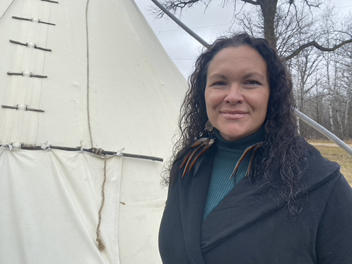New faculty member in Arts: Prof. Christy Anderson
Sun. Jan. 5, 2025
Congratulations to our new faculty members in the Faculty of Arts! We look forward to introducing each of them to you in the coming weeks.
Here we feature Prof. Christy Anderson, Lecturer in the Department of Indigenous Studies.

Dr. Tracy Whalen, Acting Dean of Arts, is pleased to welcome Prof. Christy Anderson, sharing that “Christy Anderson is a tremendous addition to the department of Indigenous Studies and to the University, bringing insights about living Mino-Bimaadiziwin, or a good life, a commitment she reflects upon in her work and life.”
Welcome Prof. Christy Anderson and thank you for sharing these insights with us!
Prof. Christy Anderson - Bio
Christy Anderson is a member of Pinaymootang First Nation in Treaty 2 territory, and she is of Mennonite settler descent, with roots to the Chortitza Colony located in modern day Ukraine. Christy is an intergenerational Indian Residential School survivor who has done extensive work to recognize the impacts that this legacy has on individuals, families, communities, and nations; she has further done critical healing work to break generational patterns associated with the legacy of trauma from the schools. She is a solo parent to two boys who have grown up with their mom being a student most of their young lives. Christy is passionate about lifelong learning, recognizing that learning comes in many forms as does what we consider “knowledge.” She is also passionate about Indigenous rights and justice issues, believing whole heartedly that “gender matters” in all things. Christy is excited to bring an Indigenous feminist perspective to all her courses in Indigenous Studies at the University of Winnipeg.
Christy began her post-secondary journey at University of Toronto Scarborough before transferring to Canadian Mennonite University to complete a Bachelor of Arts in Media and Communications (2011). She holds a Master of Arts in Indigenous Studies from the University of Manitoba (2017) and is currently a PhD Candidate in Indigenous Studies at the University of Saskatchewan. Her doctoral research asks Indigenous women what they need to feel safer during police interactions while simultaneously documenting their experiences with Indigenous community-led safety initiatives in the city of Winnipeg. Her goal is to graduate before her eldest graduates from high school in 2026!
We've invited our new faculty members to answer some questions of their choice. Here is what Prof. Anderson had to say!
Arts: What courses are you most looking forward to teaching at UWinnipeg and why?
Prof. Anderson: I am really excited to teach Indigenous Justice Issues in winter 2026. Justice is a really complex concept that the Western world has framed in a specific, individualized, and adversarial manner. The way many of us understand “justice” is in fact filled with injustices when we critically examine the systems in place that administer justice for members of society. Indigenous concepts of justice tend to be rooted in relationality—in a course like this we spend time unpacking these big concepts and denaturalizing the Western concept of “justice” that we were spoon fed from birth. This opens the door to new ways of thinking and perceiving what justice looks like from other perspectives, while imagining new futures and ways of enacting justice in broader society. I am also looking forward to developing an Indigenous feminist and queer theories course for our department. Once people view the world through the lens of Indigenous feminisms, it is hard to unsee the world in a new way.
Arts: What was one thing you learned as an undergraduate that was/has been important to you – and why?
Prof. Anderson: Two things actually and they are related. First, there are not many of us who have a straight, clear path through university or start out knowing what we want to do. I had no idea what I wanted to study, so I chose courses that sounded interesting to me which eventually led me to specific learning spaces that piqued my curiosity and contributed to my academic and personal growth. I did not do very well my first year because I A. did not study, and B. skipped classes/labs. I guarantee that no one who taught me my first year would have looked at me and said, “She’s going to do a PhD one day!” yet, here I am. My path was more like a winding road that led from one stepping stone to the next, involved learning one lesson and skill at a time, was filled with mistakes and failures, along with eventual successes, yet not one part of that journey was a waste—it all shaped me into who I am today. Being open to self-discovery and enjoying the (sometimes wild) ride is important for young adults in this phase of life.
Secondly, find a program or area of study that brings out your passion and piques your curiosity. In the end, what will keep you driven in your studies is your desire to learn more—if a class keeps you asking questions or wanting to know more, pay attention to this. As a society, we have put a lot of pressure on the end result of university when the journey is what truly shapes you and prepares you for what comes afterwards. University should be a positive life and mind-altering experience—trust that if you follow your passion, the universe will open doors for you to walk through in your future career path.
